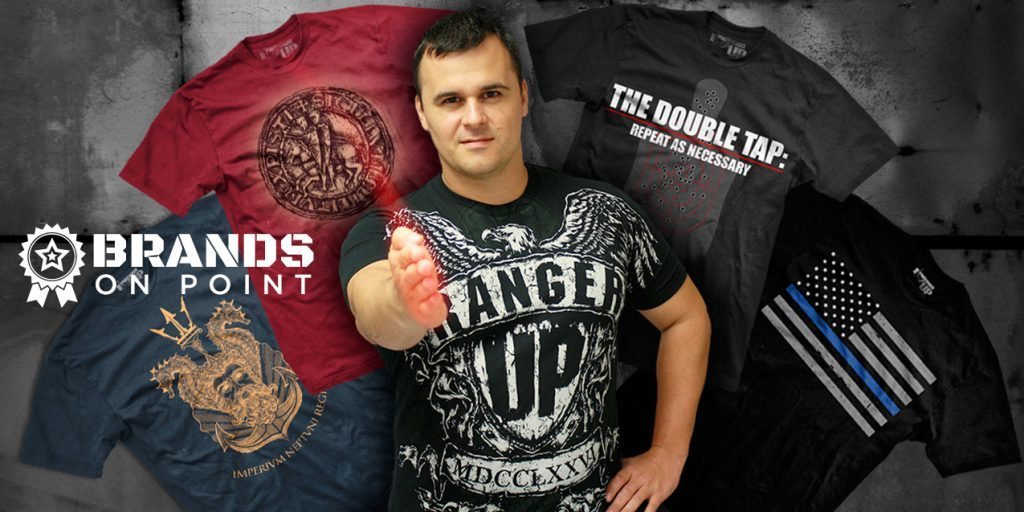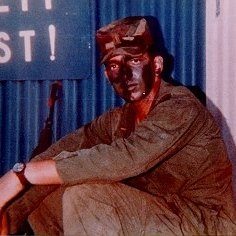Nick Palmisciano co-owner/ founder of Ranger Up wrote an epic essay to veterans explaining how they have differentiated themselves from most Americans. It has been incorrectly attributed to Gen. David Petraeus, General Norman Schwarzkopf and even “A Marine in Iraq”. Nick’s essay inspired me, caused me to reflect and I became reminded of another truth. Americans have a strong historically seated disdain for its soldiers. Before making my case, read the .45% with that thought in the back of your mind.
The 0.45%
I remember the day I found out I got into West Point.
My mom actually showed up in the hallway of my high school and waited for me to get out of class. She was bawling her eyes out and apologizing that she had opened up my admission letter. She wasn’t crying because it had been her dream for me to go there. She was crying because she knew how hard I’d worked to get in, how much I wanted to attend, and how much I wanted to be an infantry officer. I was going to get that opportunity.
That same day two of my teachers took me aside and essentially told me the following: “Nick, you’re a smart guy. You don’t have to join the military. You should go to college, instead.”
I could easily write a tome defending West Pont and the military as I did that day, explaining that USMA is an elite institution, that separate from that it is actually statistically much harder to enlist in the military than it is to get admitted to college, that serving the nation is a challenge that all able-bodied men should at least consider for a host of reasons, but I won’t.
What I will say is that when a 16 year-old kid is being told that attending West Point is going to be bad for his future then there is a dangerous disconnect in America, and entirely too many Americans have no idea what kind of burdens our military is bearing.
In World War II, 11.2% of the nation served in four years. In Vietnam, 4.3% served in 12 years. Since 2001, only 0.45% of our population has served in the Global War on Terror. These are unbelievable statistics.
Over time, fewer and fewer people have shouldered more and more of the burden and it is only getting worse. Our troops were sent to war in Iraq by a Congress consisting of 10% veterans with only one person having a child in the military. Taxes did not increase to pay for the war. War bonds were not sold. Gas was not regulated. In fact, the average citizen was asked to sacrifice nothing, and has sacrificed nothing unless they have chosen to out of the goodness of their hearts.
The only people who have sacrificed are the veterans and their families. The volunteers. The people who swore an oath to defend this nation. You.
You stand there, deployment after deployment and fight on. You’ve lost relationships, spent years of your lives in extreme conditions, years apart from kids you’ll never get back, and beaten your body in a way that even professional athletes don’t understand. And you come home to a nation that doesn’t understand. They don’t understand suffering. They don’t understand sacrifice. They don’t understand that bad people exist. They look at you like you’re a machine – like something is wrong with you. You are the misguided one – not them. When you get out, you sit in the college classrooms with political science teachers that discount your opinions on Iraq and Afghanistan because YOU WERE THERE and can’t understand the “macro” issues they gathered from books with your bias. You watch TV shows where every vet has PTSD and the violent strain at that. Your Congress is debating your benefits, your retirement, and your pay, while they ask you to do more.
But the amazing thing about you is that you all know this. You know your country will never pay back what you’ve given up. You know that the populace at large will never truly understand or appreciate what you have done for them. Hell, you know that in some circles, you will be thought as less than normal for having worn the uniform. But you do it anyway. You do what the greatest men and women of this country have done since 1775 – YOU SERVED. Just that decision alone makes you part of an elite group.
Never in the field of human conflict has so much been owed by so many to so few.
You are the 0.45%.
Nick’s experience isn’t new it in fact is repeated often in American history and mirrors some of my own 1981 experience. Some of the Jesuit instructors from my high school had strong feelings about my decision to pursue a career in the Army. No surprise, these few were also championing the same Liberation Theology gaining prominence in Latin America at the time. More disturbing were the routine interactions I had with folks back home in NYC after I donned the uniform in the 80’s asking me, “when you getting out?” They could not understand a decision to dedicate one’s life to service. Worst was the treatment from stockbrokers who crossed my path when I ventured to the Twin Towers to meet my then girlfriend circa 1987. Black Monday proved karma exists.
My last memorable experience with this disdain came almost a decade later in 1996 where at a black tie “casino night” charity affair at the Waldorf I had the unfortunate experience of meeting a well-heeled troll who commented he thought my dress mess uniform was that of a doorman. A pretty young lady attempting to defuse the pregnant pause asked what one of my awards was for. I answered, “Oh that, it’s for what I did the last time some guy confused my uniform with that of a doorman.” It got a good laugh as my detractor withdrew. The disdain that Americans have felt towards those that serve it isn’t new or uncommon. It’s in our culture actually. The forcible billeting of British redcoats in civilians’ homes was one of the factors that resulted in the Revolution and why the 3rd amendment of the Bill of Rights says, “No Soldier shall, in time of peace be quartered in any house, without the consent of the Owner, nor in time of war, but in a manner to be prescribed by law.”
Europe traditionally considered soldiers the dregs of society and for many Armies and Navies, they were. That belief was manifested in early American minds as well as deep seated suspicion of an Army because the British Army was a primary symbol of tyranny. For much of our history, the initial onset of war’s hype and “glory” created a pool of volunteers. After the euphoria dissipated, the second group “volunteered” for the war effort was from the local jail.
Early efforts at national conscription often offered a “buy out” option where draftees could pay outright to be excused from service or pay someone (typically a new lowly immigrant) to take his place. Wartime wasn’t the only time criminals were offered a tour in the Army instead of serving a sentence. During peacetime, the military was often a refuge from a jail term up until the establishment of the volunteer Army.
Most forgotten is widespread and long term prejudice that not only targeted blacks, immigrants and Indians but also featured signs on “fine” establishments in the frontier that said, “No Indians, No Dogs, No Soldiers”. Being a peacetime soldier during much of the US’s history had the equivalent stature of today’s fast food burger flipper.
This continued into the last century where in 1906, a sailor in Rhode Island bought a ticket to a dance but was denied entry when he returned in uniform. The incident reached national notoriety after Theodore Roosevelt sent him a $100 to handle legal fees. Cities near military posts in 1907 Texas placed soldiers under arrest at the slightest provocation or under false charges. Most states did not allow soldiers posted in their state to obtain residency and vote and in many a town “respectable” women were not seen in the company of a service member.
Heck, more than half a century later I remember in the ‘80’s that dating a soldier even an officer was not popular among the better families of the major towns and cities outside military bases. Desert Storm’s spirited embrace of its returning veterans wasn’t just a response to the successful prosecution of Desert Storm but an attempt to assuage America’s guilt of its treatment of Vietnam vets. America started to develop a conscience. Just like the increasing phenomena of today, Vietnam vets were commonly depicted as crazed by the media and were pilloried and ignored by their country after Vietnam.
The stereotypical crazed PTSD afflicted vet is returning thanks to the same popular media. The absurd efforts by some to portray the movie “American Sniper” as a visual monument to a racist killer exemplifies the worst of some American’s disdain for those that serve it in uniform. There are plenty of articles expressing a view of America’s vets being spoiled brats and it wasn’t very long ago that the current Secretary of State joked to students to study hard or they might find themselves in Iraq. The left especially since Vietnam, has also had a negative perception of the military adding to America’s cultural disdain but is a separate phenomena as is the incorrect belief that militaries universally cause wars.
America as many nations before it, is playing with fire as it depicts those few that have chosen to serve in a negative manner and we are fooling ourselves when we ignore that MANY Americans think military service is a waste for the “promising” individual. My intent is not to whip up sympathy or portray veterans as victims. I agree with the Ranger Up t-shirt that says, “I wanted to serve, I volunteered to serve, I knew what I was doing”. I just believe raising the issue and its historical context might help us in avoiding repeating history.
I tip my hat to those that choose to serve today and hope to remind those that don’t know about the culture of soldier prejudice.
We should remember, holding military service in low regard does not attract the best and brightest as well as “A nation that forgets those that defend it will itself be soon forgotten”.
Writer, Will Rodriquez
Originally published Jun 10, 2015 @ 07:03



